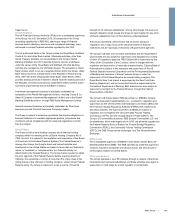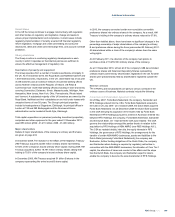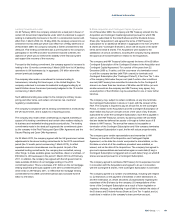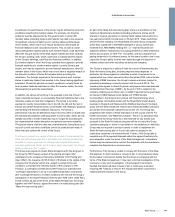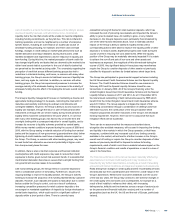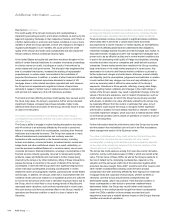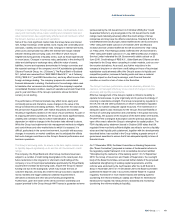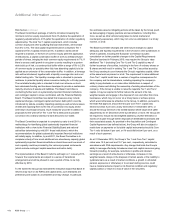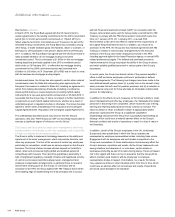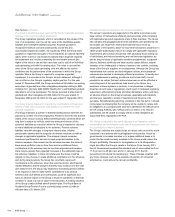RBS 2010 Annual Report Download - page 408
Download and view the complete annual report
Please find page 408 of the 2010 RBS annual report below. You can navigate through the pages in the report by either clicking on the pages listed below, or by using the keyword search tool below to find specific information within the annual report.Risk factors continued
Contractual arrangements between the company, other companies within
the Group and/or the bridge bank or private sector purchaser may be
created, modified or cancelled.
If the company were taken into temporary public ownership and a partial
transfer of its or any relevant entity’s business were effected, or if a
relevant entity were made subject to the SRR and a partial transfer of its
business to another entity were effected, the transfer may directly affect
the company and/or its Group companies by creating, modifying or
cancelling its or their contractual arrangements with a view to ensuring
the provision of such services and facilities as are required to enable the
bridge bank or private sector purchaser to operate the transferred
business (or any part of it) effectively. For example, the transfer may
(among other things) (i) require the company or Group companies to
support and co-operate with the bridge bank or private sector purchaser;
(ii) cancel or modify contracts or arrangements between the company or
the transferred business and a Group company; or (iii) impose additional
obligations on the company under new or existing contracts. There can
be no assurance that the taking of any such actions would not adversely
affect the ability of the company to satisfy its obligations under the issued
Securities or related contracts.
Apartial transfer of the company’s business may result in a deterioration
of its creditworthiness.
If the company were taken into temporary public ownership and a partial
transfer of its or any relevant entity’s business were effected, or if a
relevant entity were made subject to the SRR and a partial transfer of its
business to another entity was effected, the nature and mix of the assets
and liabilities not transferred may adversely affect the company’s
financial condition and increase the risk that the company may eventually
become subject to administration or insolvency proceedings pursuant to
the Banking Act. In such circumstances, holders of Securities may have a
claim for compensation under one of the compensation schemes
contemplated by the Banking Act, but there can be no assurance that
compensation would be assessed to be payable or that such holders
would recover any compensation promptly and/or equal to any loss
actually incurred.
While the main provisions of the Banking (Special Provisions) Act 2008
were in force, which conferred certain transfer powers on HM Treasury,
the UK Government took action under that Act in respect of a number of
UK financial institutions, including, in extreme circumstances, full and
partial nationalisation. There have been concerns in the market in recent
years regarding the risks of such nationalisation in relation to the
company and other UK banks. If economic conditions in the UK or
globally were to deteriorate, or the events described in the following risk
factors were to occur to such an extent that they had a materially adverse
impact on the financial condition, perceived or actual credit quality,
results of operations or business of any of the relevant entities in the
Group, the UK Government may decide to take similar action in relation
to the company under the Banking Act. Given the extent of the
Authorities’ powers under the Banking Act, it is difficult to predict the
effect that such actions might have on the Group and any securities
issued by the company or Group companies. However, potential impacts
may include full nationalisation of the company, the total loss of value in
Securities issued by the company and the inability of the company to
perform its obligations under the Securities.
If a relevant stabilisation option were effected in respect of the company
or the stabilisation options were effected in respect of a relevant entity or
its business within the Group, HM Treasury would be required to make
certain compensation or resolution fund orders, which would depend on
the stabilisation power adopted. For example, in the event that the Bank
of England were to transfer some of the business of a relevant entity to a
bridge bank, HM Treasury would have to make a resolution fund order
including a third party compensation order pursuant to the Banking Act
(Third Party Compensation Arrangements for Partial Property Transfers)
Regulations 2009. However, there can be no assurance that
compensation would be assessed to be payable or that holders of the
Securities would recover any compensation promptly and/or equal to any
loss actually incurred.
The Group’s businesses, earnings and financial condition have been and
will continue to be affected by the global economy and instability in the
global financial markets.
The performance of the Group has been and will continue to be
influenced by the economic conditions of the countries in which it
operates, particularly the UK, the US and other countries throughout
Europe and Asia. The outlook for the global economy over the near to
medium term remains challenging, particularly in the UK, the US and
other European economies. In addition, the global financial system has
yet to fully overcome the difficulties which first manifested themselves in
August 2007 and financial markets conditions have not yet fully
normalised. These conditions led to severe dislocation of financial
markets around the world and unprecedented levels of illiquidity in 2008
and 2009, resulting in the development of significant problems at a
number of the world’s largest corporate institutions operating across a
wide range of industry sectors, many of which are the Group’s customers
and counterparties in the ordinary course of its business. In response to
this economic instability and market illiquidity, a number of governments,
including the UK Government, the governments of the other EU member
states and the US Government intervened in order to inject liquidity and
capital into the financial system, and in some cases, to prevent the failure
of these institutions.
Despite such measures, the volatility and disruption of the capital and
credit markets have continued, with many forecasts predicting only
modest levels of GDP growth in the near to medium term. Similar
conditions are likely to exist in a number of the Group’s key markets,
including those in the US and Europe, particularly Ireland. These
conditions have exerted, and may continue to exert, downward pressure
on asset prices and on availability of credit for financial institutions and
upward pressure on the cost of credit for financial institutions, including
the company, the Royal Bank, RBS Holdings N.V. and The Royal Bank of
Scotland N.V., and will continue to impact the credit quality of the Group’s
customers and counterparties. Such conditions, alone or in combination
with regulatory changes or actions of other market participants, may
cause the Group to incur losses or to experience further reductions in
business activity, increased funding costs and funding pressures, lower
prices of the ordinary shares, decreased asset values, additional write-
downs and impairment charges and lower profitability.
RBS Group 2010406
Additional information continued



